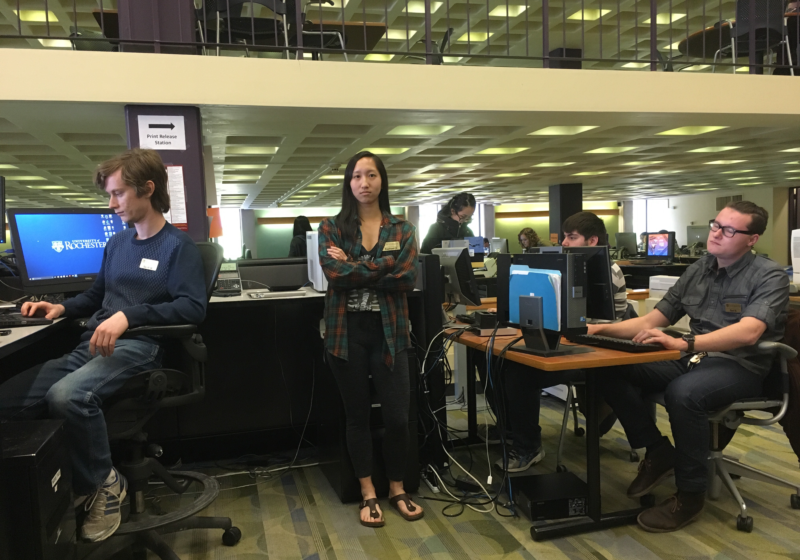Walking behind the help desk in the IT Center feels like an exclusive privilege.
Having only seen it from the outside, I’m surprised by how much is back there—the file cabinets, desktop computers, laptops, and other nondescript technological equipment. There’s a big, lime green stuffed dog in the middle, wearing someone’s official-looking, gold name tag.
So no customers will approach me, I take a seat in a low roller-wheel chair behind Rachael Hsu, who is in a high chair behind the desk counter. I take out a Pop Tart, and a debate ensues between two nearby employees about whether a Pop Tart is a snack or a meal. Snacks are allowed behind the help desk; meals are not.
When I sit down, Hsu is on the phone. She later tells me she was helping someone enroll in duo-authentication to get UR’s virtual private network (VPN) on their computer. I am joining Hsu for her 2–5 p.m., Thursday help desk shift.
A senior Electrical Engineering major, Hsu has been working for the IT Center since her freshman year. She is from Cleveland, Ohio. Growing up, her father taught her everything he knows about computers.
In June, Hsu will move to San Francisco to work as a technology consultant on cloud implementation for a company called Accenture.
“It’s like, ‘accelerating into the future,’” she laughs. “Like, that’s how they got the name.”
Hsu is wearing a flannel and a black tank top. When I ask about it, she says it’s for Phi Sigma Sigma.
“But I think this job takes up more time than my sorority does,” she adds.
The busiest time for the desk is the afternoon, although except for the phone call, Hsu takes no other cases during this shift. Much of the activity at the desk is actually between off-shift employees who are visiting on-the-clock workers.
From 9 a.m. to 9 p.m., there are four employees behind the desk: two work in the “front” and are officially under the University’s ITS payroll, and two work in the “back” and are under Residential Life’s payroll.
“Two different job codes,” someone chimes in.
“Bit of a mess,” another agrees, and I think they sound like Fred and George Weasley.
“[The Meridians] actually do play it off like we do magic,” Hsu says, and a co-worker cuts her off:
“Wait, we don’t? Speak for yourself.”
They show me their color-coded shift schedule. The blue people work the help desk, they explain. The others work for Residential Life.
I ask about where the “S” in ITS comes from. There’s no label anywhere that actually says “ITS.” Is that right?
I’m met with enthusiasm from all around. This is a hot talking point.
“ITS is an old name, essentially,” someone says.
Another adds, in a storybook manner, “This is a long time ago. This is back with the University’s IT needs were very small. Ten people who worked back there”—he gestures to the offices hidden behind the desk where a couple full-time supervisors still work—“they could do the entire University’s IT stuff. But once computers happened, they couldn’t do that anymore.”
So, most of Information Technology Services, which services all of UR, moved off campus. The room we’re in, with the help desk, is officially called the IT Center. So really, we should all be calling it “ITC.”
“No, that sounds terrible,” someone says.
While help desk employees are not allowed to make hardware repairs, only software, they are still allowed to guide customers through the process of opening up their computers. An electrical engineer, not a computer scientist, Hsu says that’s her favorite part.
“I think it’s because when I was growing up, my dad would also teach me these things, like ‘this is how you replace a keyboard in a laptop.’”
She laughs and adds, “The inside of the computer is aesthetically pleasing, as nerdy as that sounds.”
Employees also do house calls, which is news to me. If someone who lives on campus has a problem with their ethernet outlets or cables, IT Center employees (under the Residential Life payroll) will actually go in person to assess the situation.
Our conversation stops—someone has approached the desk. Everyone turns around.
A woman in UR apparel, the mother of a prospective student, speaks: “Is there a place to get coffee here?”
They direct her to Connections Café, right outside the door. She leaves, her matching family trailing behind.
IT Center employees use a ticketing system to keep track of every task they complete in case it comes up in the future. Every hour on the half-hour, they record a head count, too.
According to Hsu, this ticketing system is useful for diagnosing future tech problems (chances are if an employee doesn’t see the problem, someone else has already faced a similar case), but the meticulous record keeping is also a way of proving their job’s value to the University.
I ask Hsu what the most dramatic case she’s seen is. She describes how when she first started working for IT, a professor had inserted a virus via USB into her computer, but would not share with Hsu what was on the USB. Of course, my mind went to the darkest places.
Hsu had to call her supervisor in on a Saturday because she did not have access to the administrative passwords needed to wipe the desktop computer’s O.S.
“I guess emotional-wise, that was the most high-intensity time I had at work […] I just remember being this very scared freshman having to deal with this.”
It’s 4:20, and on Hsu’s computer screen blares a bright red box: “DO THE HEADCOUNT!”
One of Hsu’s coworkers gets up and makes his rounds.

